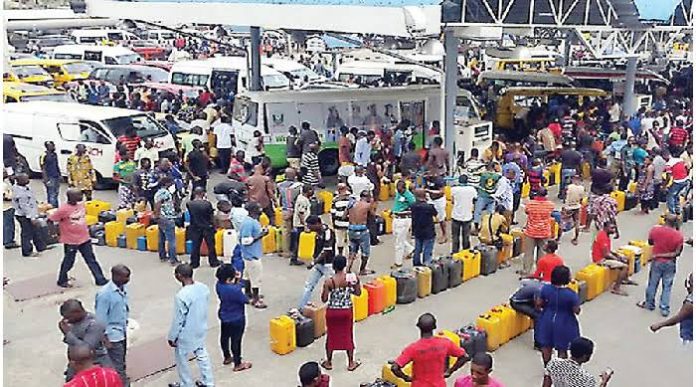- Blame NNPCL
Petrol scarcity has continued to bite harder across Nigeria.
In Abeokuta, the Ogun State capital on Tuesday, only few vehicles were plying major roads in the city, as most of the fueling stations shut their gates to motorists.
Also, few commercial motorcycles and taxi cabs were seen on the roads, as most of them were searching for petrol. Several commuters were stranded in parts of the city.
The few taxi cabs still operating jerked up fare by 50 to 70 percent on all the routes.
A handful of fueling stations sold a litre of petrol for prices ranging from N220 to N250.
Some of the fueling stations sold the product for thirty minutes or two hours and shut their gates to motorists.
The marketers blamed the acute shortage of petrol on the sharp shortfall in supply from the Nigerian National Petroleum Company.
For instance, marketers said there is no stock at all the NNPCL depots, while most of the private depots also have no fresh supply of the products.
Oil marketers also warned that the frequent appearance of queues of desperate motorists at filling stations in search of petrol, could affect the Christmas and New Year festivities.
It was also gathered that oil marketers were now free to sell petrol at any rate as the Federal Government was no longer restraining them from dispensing the commodity at a regulated price.
Fuel queues have continued to appear and disappear since January this year despite the hike in the cost of the commodity by oil marketers without any approval from the Federal Government or sanctions imposed on them.
Rather than speak on the matter, the Federal Government, through its Nigeria Midstream and Downstream Petroleum Regulatory Authority, chose to remain mute.
Officials of the agency neither answered calls, nor replied to text messages sent to their mobile phones on issues of the scarcity of petrol nationwide.
Similarly, the sole importer of PMS into the country, the Nigerian National Petroleum Company Limited, has refused to make any comment on the development.
The NMDPRA, in its report on product sufficiency on Thursday, however, claimed that there was 33.17-day sufficiency of PMS in the country as of November 24, 2022. It also stated that about 2.1 billion litres of petrol was in stock despite the widespread queues nationwide.
But oil marketers countered the government as they argued that there had been concerns around logistics and the supply of products by the national oil company and sole importer.
They also stated that some new charges had been introduced in the downstream oil sector, which had given rise to a hike in the ex-depot price of petrol, adding that all these concerns could further make the current fuel queues to linger beyond December.
“Recently, there have been a lot of charges that marketers pay. There are some charges that the NNPC adds to the pump price, but recently we were told to be prepared to bear freight charges and others,” a major marketer, who pleaded not to be named due to lack of authorisation, stated.
The official added, “Also, pipeline charges that used to be 50 kobo before, are now N1 per litre. Now, these charges force depot owners to increase their ex-depot rates as against the one proposed by the NNPC.
“These and more concerns have led to the crisis in the downstream sector and it may stretch till December or even beyond if nothing tangible is done to address the challenges.”
Asked if the government was no more concerned about the pump price of petrol, the marketer replied, “Nobody cares about how much you sell now. That is why you cannot see the NNPC ex-depot prices to be the same in all the depots.
“There are some changes in rates now, which the NNPC cannot accommodate and they have to push it to marketers to absorb. This is why you see people sell at different rates.”
The National Public Relations Officer of the Independent Petroleum Marketers Association of Nigeria, Ukadike Chinedu, also said that the scarcity of foreign exchange was also a setback to petroleum products supply.

